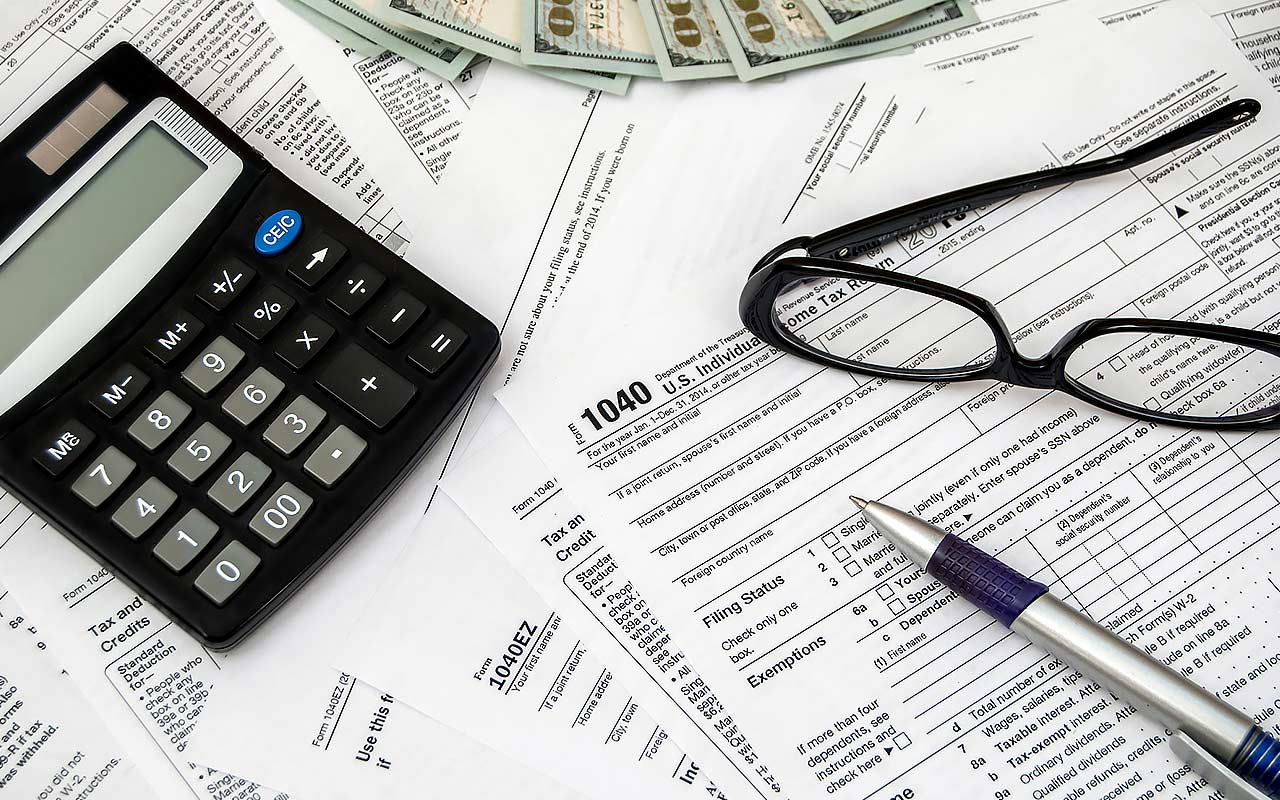3 Tips for Retirees Filing Their 2020 Tax Returns
Seniors should pay attention to changes related to charitable giving, required minimum distributions and the Recovery Rebate Credit when completing their taxes.


Profit and prosper with the best of Kiplinger's advice on investing, taxes, retirement, personal finance and much more. Delivered daily. Enter your email in the box and click Sign Me Up.
You are now subscribed
Your newsletter sign-up was successful
Want to add more newsletters?
The CARES Act and the COVID-Related Tax Relief Act, which were both enacted last year, included several tax breaks to help Americans battered by the pandemic. Now it’s time to fill out your 2020 tax return by the May 17 deadline to claim what you’re due. (The deadline was previously April 15 but was delayed because of the pandemic.)
This year’s tax return may be different because of the new tax breaks. For many seniors, the changes for charitable giving, required minimum distributions and the new Recovery Rebate Credit deserve the most attention, according to Letha McDowell, president-elect of the National Academy of Elder Law Attorneys.

Charitable Donations
If you claim the standard deduction, McDowell says you can “deduct up to $300 of charitable contributions” made in 2020. This new CARES Act deduction is claimed on Line 10b of either Form 1040 or 1040-SR. There are a few limitations, though. First, you can’t claim the deduction if you itemize. Second, it’s only good for cash donations. Third, donations to donor-advised funds and certain organizations that support charities are not deductible.
There’s some concern that seniors will overlook this new deduction, so it’s important to check your records. “Lots of people will give a little bit here and there and it’s not a big deal, and if you don’t itemize, you don’t keep track of it,” McDowell says. “But this year it’s worth going back and looking at your canceled checks.”
Seniors who itemize get a break, too. The amount deductible for cash contributions is generally limited to 60% of adjusted gross income, but the CARES Act lifted that limit. Instead, the 2020 limit is 100% of AGI for cash donations to charities. Again, donations to donor-advised funds and supporting groups don’t count.

RMD Waivers
The CARES Act waived 2020 RMDs, and retirees who took one before the legislation was passed in March were allowed to put the money back. In fact, if you took an RMD between Jan. 1 and June 30, 2020, you had until Aug. 31 to repay it, with the repayment treated as a tax-free rollover. If taxes were withheld from your RMD, you had to repay that amount, too. However, you can reclaim the withheld taxes as a tax credit on your 2020 return (use Line 25b).
If you didn’t repay any part of an RMD in time (including the withheld taxes), what you kept is taxable income. Any distribution taken in the second half of 2020 is also taxable. You must report taxable distributions from IRAs on Line 4b and from a 401(k) or other pension plan on Line 5b of Form 1040 or 1040-SR.
McDowell also warns: “RMDs are back for 2021.” If you’re at least 72 years old by the end of the year, you must take an RMD. If you turn 72 in 2021, you can wait until April 1, 2022, to take your first RMD. Otherwise, you must take this year’s RMD by Dec. 31.

Recovery Rebate Credit
The stimulus checks authorized last year were advance payments of a new “recovery rebate” tax credit for the 2020 tax year. If you did not receive all the stimulus money you were entitled to, either in the first or second round of payments, you can still get the full amount you’re owed by claiming the credit. To do so, file a 2020 tax return and claim the credit on Line 30. “A lot of seniors, if their only income is Social Security or Social Security and a small pension, don’t necessarily file a return,” says McDowell. “But they have to file a 1040 or 1040-SR in order to get any additional funds that they didn’t receive already.”
Another stimulus-related reason to file a return is to have a better shot at getting a full payment for another round of stimulus checks. Stimulus payments are easier for the IRS to process if you file a return. “We don’t know what else is going to transpire,” notes McDowell. “We’re still in the middle of a pandemic, so who knows if there’s going to be another round of this. So even if you don’t think you have to file, file.”
Because of the IRS’s huge backlog of paper returns, e-filing is recommended. Electronic filing and payment are the only way to ensure that everything gets filed appropriately, McDowell says.
Profit and prosper with the best of Kiplinger's advice on investing, taxes, retirement, personal finance and much more. Delivered daily. Enter your email in the box and click Sign Me Up.
Rocky Mengle was a Senior Tax Editor for Kiplinger from October 2018 to January 2023 with more than 20 years of experience covering federal and state tax developments. Before coming to Kiplinger, Rocky worked for Wolters Kluwer Tax & Accounting, and Kleinrock Publishing, where he provided breaking news and guidance for CPAs, tax attorneys, and other tax professionals. He has also been quoted as an expert by USA Today, Forbes, U.S. News & World Report, Reuters, Accounting Today, and other media outlets. Rocky holds a law degree from the University of Connecticut and a B.A. in History from Salisbury University.
-
 Big Nvidia Numbers Take Down the Nasdaq: Stock Market Today
Big Nvidia Numbers Take Down the Nasdaq: Stock Market TodayMarkets are struggling to make sense of what the AI revolution means across sectors and industries, and up and down the market-cap scale.
-
 How Medicare Advantage Costs Taxpayers — and Retirees
How Medicare Advantage Costs Taxpayers — and RetireesWith private insurers set to receive $1.2 trillion in excess payments by 2036, retirees may soon face a reckoning over costs and coverage.
-
 3 Smart Ways to Spend Your Retirement Tax Refund
3 Smart Ways to Spend Your Retirement Tax RefundRetirement Taxes With the new "senior bonus" hitting bank accounts this tax season, your retirement refund may be higher than usual. Here's how to reinvest those funds for a financially efficient 2026.
-
 3 Smart Ways to Spend Your Retirement Tax Refund
3 Smart Ways to Spend Your Retirement Tax RefundRetirement Taxes With the new "senior bonus" hitting bank accounts this tax season, your retirement refund may be higher than usual. Here's how to reinvest those funds for a financially efficient 2026.
-
 5 Retirement Tax Traps to Watch in 2026
5 Retirement Tax Traps to Watch in 2026Retirement Even in retirement, some income sources can unexpectedly raise your federal and state tax bills. Here's how to avoid costly surprises.
-
 First the Penny, Now the Nickel? The New Math Behind Your Sales Tax and Total
First the Penny, Now the Nickel? The New Math Behind Your Sales Tax and TotalRounding Tax A new era of "Swedish rounding" hits U.S. registers soon. Learn why the nickel might be on the chopping block, and how to save money by choosing the right way to pay.
-
 Over 65? Here's What the New $6K Senior Tax Deduction Means for Medicare IRMAA
Over 65? Here's What the New $6K Senior Tax Deduction Means for Medicare IRMAATax Breaks A new tax deduction for people over age 65 has some thinking about Medicare premiums and MAGI strategy.
-
 How to Open Your Kid's $1,000 Trump Account
How to Open Your Kid's $1,000 Trump AccountTax Breaks Filing income taxes in 2026? You won't want to miss Form 4547 to claim a $1,000 Trump Account for your child.
-
 In Arkansas and Illinois, Groceries Just Got Cheaper, But Not By Much
In Arkansas and Illinois, Groceries Just Got Cheaper, But Not By MuchFood Prices Arkansas and Illinois are the most recent states to repeal sales tax on groceries. Will it really help shoppers with their food bills?
-
 7 Bad Tax Habits to Kick Right Now
7 Bad Tax Habits to Kick Right NowTax Tips Ditch these seven common habits to sidestep IRS red flags for a smoother, faster 2026 income tax filing.
-
 New Bill Would Eliminate Taxes on Restored Social Security Benefits
New Bill Would Eliminate Taxes on Restored Social Security BenefitsSocial Security Taxes on Social Security benefits are stirring debate again, as recent changes could affect how some retirees file their returns this tax season.

